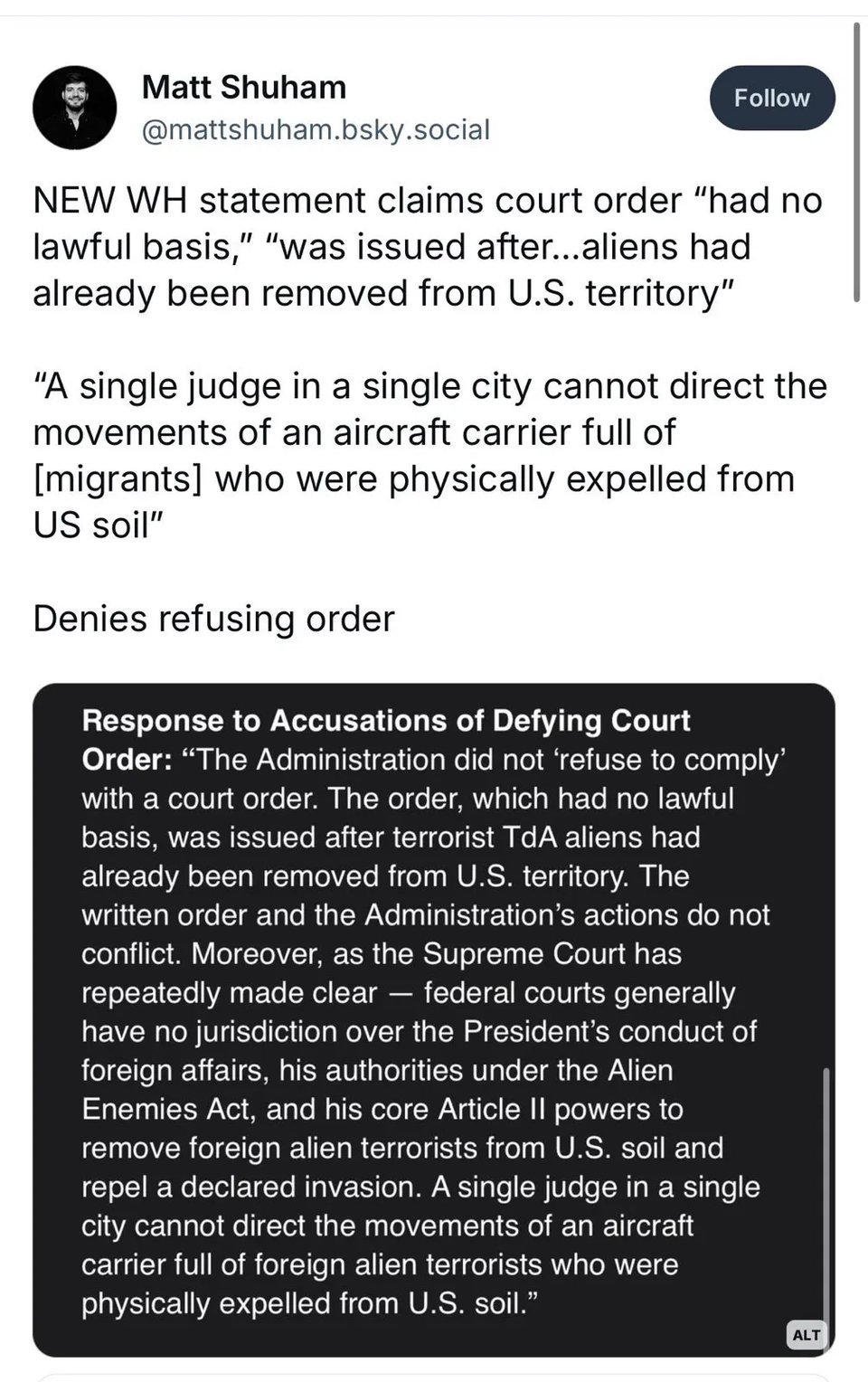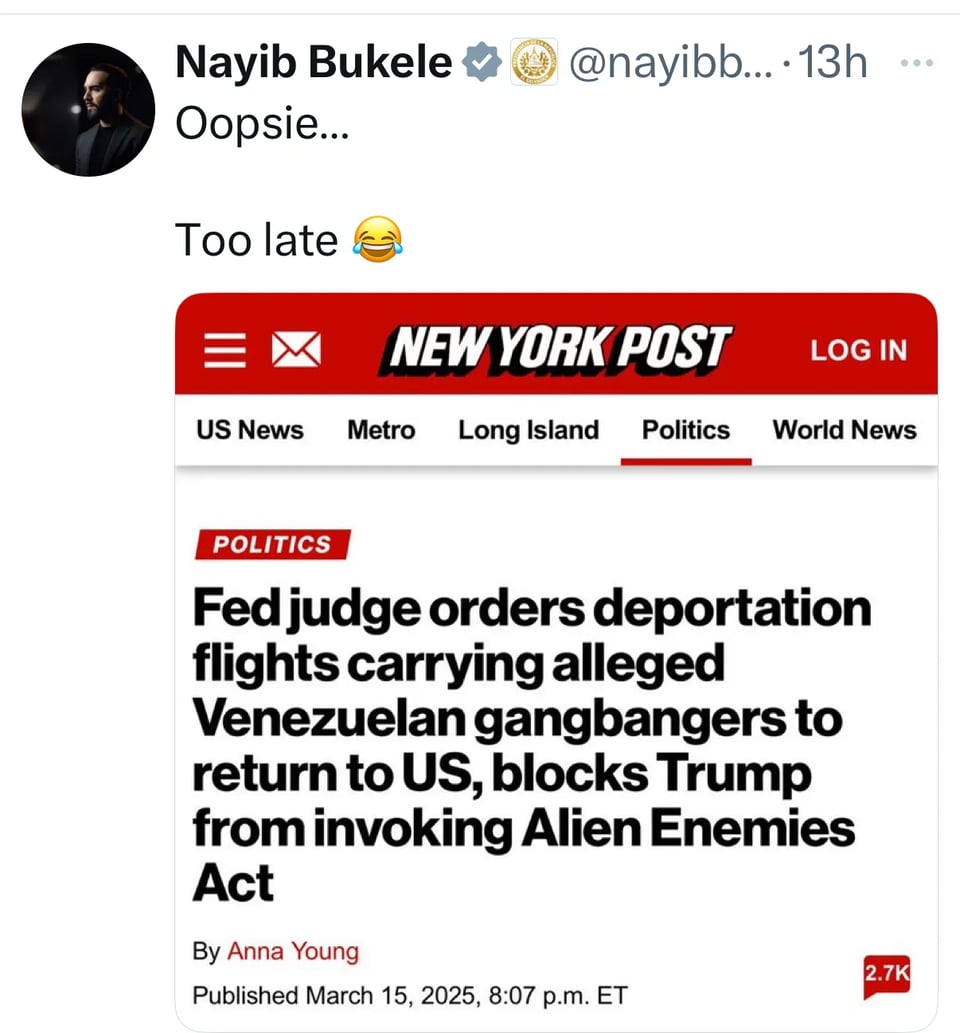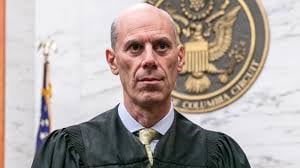Tuesday, March 18, 2025. Annette’s Roundup for Democracy.
From Charlie Sykes, conservative political commentator.
“A nation of sheep will beget a government of wolves.” ―Edward R. Murrow
**
While you (hopefully) slept, Trump defied a federal court order on deportations; declared Biden’s pre-emptive pardons of J6 Committee members “VOID, VACANT, AND OF NO FURTHER FORCE OR EFFECT”; and shut down more federal agencies without congressional approval.
None of this is legal.
A shameful weekend in America’s history.
The rule of law is being challenged.
This is very sad as well as dangerous.
The Slippery Slope of Lawlessness by William Kristol

We’re Well Past Alarm Bells. The Trump administration is mocking court orders, laying the groundwork for political retribution, and declaring open war on the rule of law.
This past Saturday afternoon I should have been outside enjoying a nice spring day here in the D.C area. I could even have been getting some exercise—though on that front I increasingly have Churchill’s view: “Whenever I feel the need to take some exercise, I lie down until the feeling goes away.”
In any case, I was inside, at my desk, listening on my computer to an emergency hearing presided over by the chief judge of the United States District Court for the District of Columbia, Jeb Boasberg. Plaintiffs, represented by the American Civil Liberties Union, were seeking a temporary restraining order halting the deportation of alleged Venezuelan gang members already in custody in the United States who were being sent to a prison in El Salvador with no opportunity for a hearing or any requirement that evidence be presented.
The lawyer for the government defended its actions. He cited the Alien Enemies Act, which President Trump had just invoked for only the fourth time in U.S. history, and for the first time when we were not at war. He claimed the president has something like an uncheckable and unreviewable “war power” under Article II of the Constitution. He also argued that being sent to an El Salvadoran prison wouldn’t constitute “irreparable harm,” the standard a temporary restraining order has to meet.
Judge Boasberg found for the plaintiffs and imposed a temporary restraining order on the government.
This, I thought as I listened, was the rule of law in practice. The hearing was sober and orderly and deliberate, with little in the way of emotion or soaring rhetoric. I found it not merely impressive but oddly moving. I felt a sense of pride and gratitude that we live in a country with a well-established rule of law—something rare in human history.
It was a reminder of why the rule of law—why our rule of law, the edifice we’ve built up over two and a half centuries—is something to be respected, something to be honored. I’d even go so far as to say that it’s something to be cherished.
In Federalist No. 51, defending the separation of powers and its pitting of ambition against ambition and its connecting the interest of office-holders with the constitutional rights of the place, James Madison explained:
It may be a reflection on human nature, that such devices should be necessary to control the abuses of government. But what is government itself, but the greatest of all reflections on human nature? If men were angels, no government would be necessary. If angels were to govern men, neither external nor internal controls on government would be necessary. In framing a government which is to be administered by men over men, the great difficulty lies in this: you must first enable the government to control the governed; and in the next place oblige it to control itself.
We’re not angels. And rule by angels isn’t available to us. To avoid anarchy, we need a government that can control our potentially violent passions. And we need the rule of law and its institutional buttresses like the separation of powers to enable us to live in freedom, not despotism.
This fundamental feature of a free government is what the Trump administration is challenging. One sees this when Attorney General Pam Bondi, speaking at the Department of Justice, pledges fealty to the president, saying Justice Department lawyers should be proud “to work at the personal direction of Donald Trump,” and that “we will never stop fighting for him.” And of course one sees the challenge in a host of actions by the Trump administration, in areas ranging from immigration to abrogating legal protections for civil servants to trampling on Congress’s power to appropriate funds and to direct their spending.
The day before Judge Boasberg’s hearing, Vice President JD Vance was interviewed by Laura Ingraham on Fox News. Vance was discoursing on Germany, a country about which he has strong opinions, as evidenced by his endorsement of the extremist Alternative für Deutschland before last month’s German elections.
In the interview, Vance claimed that “Europe is on the brink of civilizational suicide,” in large part because of its failure to control its borders. “If Germany takes in millions more incompatible migrants, it’ll destroy itself. America can’t save it.”
Of course, Germany did destroy itself almost a century ago. It almost destroyed civilization itself until America stepped in to help save it. That didn’t happen because Germany took in too many migrants. It happened because the German people fell for arguments uncomfortably close to Vance’s. Those were arguments that derided the very concept of the rule of law, a derision that was defended in part by warnings about immigrants and foreign blood.
The Trump White House did not abide by Boasberg’s order to turn the planes around. It claims the planes were over international waters and, incorrectly, thus no longer subject to his jurisdiction. But even if there was no direct violation of the rule of law, the next day featured several vocal demonstrations of contempt of it. The Trump administration seems aggrieved by the idea they’d be restricted in any way by any judge. It feels like a matter of time before they simply, brazenly, refuse to be.
One trusts that the United States isn’t going to go the way of Germany in the last century. But the slope toward lawlessness is a slippery one, and we have an administration that is eagerly leading us down it. There are still footholds we can grab onto in order to arrest the precipitous decline that lies ahead. But we are already part way down the hill, and the pace of decline is accelerating. (Irving Kristol, The Bulwark).
Joyce Vance. Civil Discourse.
It’s going to be an eventful week. That’s already clear. Chief among the issues is whether this is the week we reach the tipping point where the administration flagrantly ignores a federal court’s order, and we begin to see the ensuing constitutional crisis, which would be full blown at that point, play out. It’s not a prospect any of us relish focusing on, but nothing gets better just because you look the other way.
Every federal prosecutor, really every lawyer, understands this one basic rule: If a court orders you to do something, you do it. If you don’t like the ruling, you can appeal it at the appropriate time, but unless and until that order is reversed, like it or not, you must obey it.
Democracy flows from this basic underpinning of the rule of law. It guarantees certainty and clarity so that people can contract, invest, feel safe, trust government—because everyone must follow the same laws. If Trump busts that covenant with the people, then our government is no longer a government by, for, and of the people. It is a government of Donald Trump, and it operates at his whim.
Here’s what happened:
The ACLU and Democracy Forward sued the government over its efforts to deport people alleged to be Venezuelan Tren de Aragua gang members using the Alien Enemies Act. It asked the Judge to enjoin the deportations.
The Alien Enemies Act that the government claimed it was operating under is the same law used to put people of Japanese ancestry in camps during World War II. The law, passed in 1798, gives a president, once he issues a public proclamation, wartime authority to arrest and deport citizens of a country engaged in a “declared war” or “invasion or predatory incursion” against the United States.
Federal Judge James Boasberg in the District of Columbia issued a temporary restraining order to stop deportations under the law while he considered the issues. He ordered planes that were up in the air at the time of his decision to return to the United States.
There is some suggestion the government didn’t do that, but there are some technical issues involving what happened and when, like the location and timing of flights, some differences between the Judge’s oral directions in court and the minute order he entered in the record, and when the order became effective. The legal position the government is in isn’t entirely clear yet. It’s possible that they didn’t technically violate an order that was in effect.
But, whatever the outcome of the legal argument, the government skipped over the spirit of the ruling and, as lawyers know (see above), you don’t slice that close to violating a court order. You comply with it and then you appeal if you disagree with it. If there’s any doubt, you err on the side of caution.
The government didn’t do that and according to reporting in Axios, there is some indication that they are spoiling for a fight on this issue. Axios also reports, “White House Deputy Chief of Staff Stephen Miller ‘orchestrated’ the process in the West Wing in tandem with Homeland Security Secretary Kristy Noem. Few outside their teams knew what was happening.”
After the plaintiffs learned Saturday afternoon that two ICE flights were flying from Texas to El Salvador, they went to court to ask the Judge for the emergency order. El Salvador, which had agreed to accept Venezuelan gang members deported from the U.S in a for-pay prison situation, is not exactly known as a bastion of human rights. There are good reasons to doubt the legality of the scheme.

During the hearing, Judge Boasberg said any flights in progress should return to the United States. “This is something that you need to make sure is complied with immediately,” he told the Justice Department, according to The Washington Post.
The government claimed it did not flout the order, but the reasoning is circular. If it is challenging the order’s legality, there is only one correct way to do it, with an appeal.

And their case is not improved by the fact that White House communications director Steven Cheung retweeted Salvadoran President Nayib Bukele’s social media post that said “Oopsie…Too late,” and claimed the detainees had been transferred to a “Terrorism Confinement Center.”

In the coming days, we will see more about the location of the planes when the order was issued and whether that impacted, in any way, the government’s obligation to follow the court order. But ultimately this is headed straight to the constitutionally dangerous place we’ve know we were headed since Trump first began to take unprecedented steps towards consolidating power in his hand: to the Supreme Court, where Trump will be hoping for a decision that supplants the balance of power among our three branches of government with a ruling endorsing the “unitary executive” theory that puts the presidency atop the system.
Simply put, Trump wants a ruling that says he can do these deportations regardless of other legal issues, because he is the president, and the president has the power to do whatever he deems necessary under Article II of the Constitution.
The unitary executive theory is really just a way to cloak the morphing of a democratically elected president into a dictator with the appearance of legality. If presidents can do whatever they want, including putting people on a plane and sending them to prisons in a foreign country with no due process whatsoever, then really, who are we? The Supreme Court started Trump down this path with the criminal immunity ruling in his favor. Whether they will pump the brakes now, before it’s entirely too late, remains to be seen.

Judge Boasberg is no stranger to issues involving national security and immigration; he has served on some of the specialty courts in the federal system, including the Alien Terrorist Removal Court and the Foreign Intelligence Surveillance Court. He was a prosecutor in the U.S. Attorney’s office in the District of Columbia before he became a judge. He understands the duty the government has here. All that to say, this is a Judge who understands how the system works and how it’s supposed to work. That’s important as the government prepares to push the limits of what can be deemed compliance with the court’s order to its precise literal terms, not what it was clearly contemplated to include.
We are inevitably headed, whether it’s in this case or another, to a confrontation between a president who has rejected the rule of law and a judge sworn to enforce it. We are in an exceedingly dangerous moment for democracy.
In the early weeks of the Trump administration, rather than openly defy court orders, as there was some suggestion they were considering doing on social media, the government turned to the normal route—appealing decisions against them in cases involving DOGE, federal spending, and birthright citizenship. That happened after several Senators took what in normal times would have been the unnecessary step of advocating for compliance with the rule of law. Now, we’re at the moment again, as it has always been clear we would be at some point. So far, there has been no outcry on the right that we must remain a rule of law country.
We’ll watch what happens in this case, along with a case filed in Boston, where the government allegedly deported a surgeon who is a kidney transplant specialist and Brown University professor to her native Lebanon. The Judge in that case, Leo Sorokin, ordered the government to give the court 48 hours notice before deporting her.
This evening, Vice President JD Vance tweeted “There were violent criminals and rapists in our country. Democrats fought to keep them there. President Trump deported them,” referring to the Venezuelans.
But the Yale-educated Vice President misses an important point, which is that we protect everyone’s rights in this country, not just people we like. And it couldn’t be clearer why. It’s a steep slippery slope from the alleged gang members (no court has confirmed that designation) to a noted surgeon and then onto others. If the law doesn’t apply, then the government is free to violate our rights at will.
Sunday morning, Judge Sorokin filed an order requiring the government to respond to what he called “serious allegations” they had violated his order in advance of a Monday hearing. Tomorrow, the week gets off to a very serious start.
I had planned to write to you tonight about a number of new developments on multiple fronts, all important. But these deportation cases, which cropped up Saturday, are one of the most significant developments so far in Trump 2.0, and I wanted to give you a good level of detail. So I’ll hold the rest for tomorrow or later in the week.
Lee Gelernt, deputy director of the ACLU’s Immigrants’ Rights Project and friend of this newsletter, put it like this: “The Trump administration’s intent to use a wartime authority for immigration enforcement is as unprecedented as it is lawless. It may be the administration's most extreme measure yet, and that is saying a lot.”
This is a week to stay engaged. There are lots of details to untangle, lots of hot takes whose validity will be explored in the next 24 hours. But wherever this ends up with the courts, it’s clear that Trump intends to act like a dictator, not like a president.
“The United States is not at war, nor has it been invaded. The president’s anticipated invocation of wartime authority — which is not needed to conduct lawful immigration enforcement operations — is the latest step in an accelerating authoritarian playbook,” said Skye Perryman, president and CEO of Democracy Forward. “From improperly apprehending American citizens, to violating the ability of communities to peacefully worship, to now improperly trying to invoke a law that is responsible for some of our nation’s most shameless actions, this administration’s immigration agenda is as lawless as it is harmful.”
“There is no foreign military action to justify President Trump’s intended invocation of this act, making his actions not only unlawful but an outright assault on fundamental rights. This is yet another dangerous overreach by the administration, designed to support an unchecked mass deportation program, all while bypassing the necessary judicial review,” said Arthur Spitzer, senior counsel at the ACLU of the District of Columbia.
We’re in this together,
Joyce (Substack).
One more thing.

Driving the news: [ Trump's border czar Tom] Homan claimed in a Fox News interview Monday that the two deportation flights to El Salvador did not need to be turned around because they were already above international waters when the order came through.
"We are going to make this country safe again ... I'm proud to be a part of this administration. We are not stopping. I don't care what the judges think. I don't care what the Left thinks. We're coming," he added.
Asked what was coming next in the administration's deportation efforts, Homan said: "Another flight. Another flight every day."
Trump is always crazy.
Last week at the Justice Department, in an incoherent tirade, Trump made it clear he wanted retribution for those he perceived as his enemies.
On Monday, he made clear that he’s furious that Joe Biden thwarted him with pre-emptive pardons for those who were involved in charging him with crimes in connection with January 6th.
He is out of control with rage. So this happened.
Trump says autopen use makes Biden's pardons for Jan. 6 panel "VOID.
President Trump claimed Monday that former President Biden's preemptive pardons to members of the House Jan. 6 select committee and others are "VOID" and "VACANT" because they were "done by Autopen."
Why it matters: Experts cast doubt on Trump's rationale, and said it was unlikely that a court would allow a president to revoke or nullify his predecessor's pardons.
It's the latest example of Trump testing the limits of executive power, and could set the stage for a legal showdown with some of his staunchest political enemies.
Driving the news: Trump contended in a late-night Truth Social post that Biden's pardons are "hereby declared VOID, VACANT, AND OF NO FURTHER FORCE OR EFFECT" and that the "necessary Pardoning Documents were not explained to, or approved by, Biden."
The committee members should "fully understand that they are subject to investigation at the highest level," Trump wrote.
He claimed without evidence that the members of the committee, which include former Rep. Liz Cheney (R-Wyo.), were "probably responsible for the Documents that were signed on their behalf" without Biden's knowledge.
Zoom in: As long as a pardon is valid, it is final, says Jeffrey Crouch, an American University professor and expert in federal executive clemency.
"Other presidents have used an autopen to grant pardons," he said.
Kimberly Wehle, a University of Baltimore law professor who has written extensively about the pardon power, said Trump would likely lose a legal challenge on his argument.
"There's no magic in the mechanism of a pardon," she said of the signature machine versus Hancock-by-hand debate.
But that's perhaps beside the point, Wehle said. Targeting people who were already pardoned could tee up an expensive, stressful legal battle — and even if the courts were to rule against Trump, "the damage, to some degree, will already have been done."
Catch up quick: Biden, in the final days of his presidency, issued historic preemptive pardons, granting broad immunity to people whom Trump had targeted with threats to investigate or jail.
Biden in a statement at the time said the pardons should not be construed as an "acknowledgment that any individual engaged in any wrongdoing."
Beyond lawmakers on the Jan. 6 panel, Biden issued pardons for retired U.S. Army Gen. Mark Milley, former NIAID Director Anthony Fauci and his family members — shielding them from what he described as attacks driven "solely by a desire to hurt me."
What they're saying: "I am not afraid of Trump's latest midnight rant that has no basis in reality," said Rep. Bennie Thompson (D-Miss.), who chaired the committee, in a statement provided to Axios. (Axios).
Democrats divided.
“Where have you gone, Joe DiMaggio? Our nation turns its lonely eyes to you.”
‘Full of despair’: Senate Dems look to regroup after losing shutdown fight
Senate Democrats are bracing for a painful post-mortem as they try to avoid a September rerun of their latest government funding defeat.
Chuck Schumer, the Senate minority leader, and nine of his members helped get a House GOP-authored government funding bill to the finish line, saying a vote to advance legislation they loathed was the least bad option. The alternative, they argued, was allowing a shutdown that could empower President Donald Trump and Elon Musk to accelerate their slashing of the federal bureaucracy.
This isn’t the first time since the start of Trump’s second administration that the party had real leverage to fight the president, as Republicans needed Democratic votes to overcome a filibuster. Democrats could have refused to put up those votes to avert a shutdown, but Schumer folded instead. This gambit is now raising internal questions about how Democrats will handle the next shutdown deadline at the end of September — and how they can avoid the same result.
Schumer’s strategy exposed major fissures within the party, marking for many of his members a disappointing retreat. It’s also raised questions among some Democrats about whether it’s time for the New Yorker to step aside — though no senators have publicly embraced those calls.
“We should do a retrospective,” said Sen. Ruben Gallego (D-Ariz.). Asked whether his party lost some of its clout by acquiescing to the GOP’s funding bill, Gallego said: “That was my concern.”
Senate Democrats have already started discussing privately how to avoid getting rolled again. They bet this month that House Republicans would never be able to pass a stopgap funding bill without Democratic support, and Democrats hoped they could leverage that failure into a bipartisan deal. That assumption backfired when Speaker Mike Johnson called their bluff, sending the Senate a funding patch that passed the House with only one Republican opposing it.
“We were just talking about that,” Sen. Mark Kelly (D-Ariz.) said when asked how the party will pursue the next funding fight. “We’ve got to come up with a plan.”
Some Democrats are now afraid that they inadvertently gave Republicans a playbook for government funding fights in the future: Cut Democrats out of the negotiations, muscle legislation through the House with only GOP votes and bet they can jam the Senate. Sen. Chris Murphy (D-Conn.) pointed to that possibility as he laid out his frustrations after the Senate cleared the funding measure Friday night, warning that Democrats set a “really dangerous precedent” and questioned “why would Republicans work with us” going forward.
Schumer, in a sit-down with reporters last week, acknowledged that Republicans could try to jam them again in September. But Schumer said he’s betting that Trump’s actions and policies will make him less popular, which could splinter congressional Republicans in the coming months and give Democrats a “decent chance” at more leverage heading into September negotiations. Other Democratic senators indicated they feel similarly.
“With the failed Trump economic policies, with a market that continues to wobble at best … I think a lot of this is going to start bubbling up,” said Sen. Mark Warner (D-Va.). (Politico)
Schumer Postpones Book Tour Amid Backlash to Voting With Republicans
Many Democratic activists, desperate for their leaders to stand up to President Trump, have been staging protests outside of Senator Chuck Schumer’s home and calling for his resignation.

Senator Chuck Schumer, Democrat of New York and the minority leader, on Monday postponed a multicity tour to promote his forthcoming book, citing security concerns amid backlash to his decision to vote with Republicans for a stopgap spending bill to stave off a government shutdown.
Mr. Schumer was scheduled to participate in promotional events in Atlanta, Washington, Baltimore, Philadelphia and New York, as well as a few stops in California, for his new book, “Antisemitism in America: A Warning.” Many Democratic activists, desperate for their leaders to stand up to President Trump, have been staging protests outside of Mr. Schumer’s Brooklyn home and calling for his resignation. Online, they have been organizing protests for every stop on his book tour.
A spokeswoman for Mr. Schumer said that the tour was being rescheduled because of “security concerns.” But the move was immediately criticized by both the right and the left, who accused Mr. Schumer of being unwilling to face a restive public.
“We hope other Democratic senators continue meeting with their constituents and demand that their leadership fight with backbone,” Adam Green, the co-founder of the Progressive Change Campaign Committee, said in a statement.
Since voting on Friday for the stopgap bill, Mr. Schumer has been defending his decision to stave off a government shutdown, which he has said was the less devastating of two bad options that Senate Democrats were presented with. “I’ll take some of the bullets,” Mr. Schumer said of the vitriol directed at him.
“There is no off-ramp,” for a government shutdown, Mr. Schumer said in an interview Friday from his office just off the Senate floor. “The off-ramp is in the hands of Donald Trump and Elon Musk and DOGE. We could be in a shutdown for six months or nine months,” he said, referring to Mr. Musk’s cost-cutting team, the Department of Government Efficiency.
Mr. Schumer said that a shutdown would have allowed Mr. Trump to decide which programs were essential, and which were not. “The day after the shutdown, they can say all of SNAP is not essential, we’re not funding it,” Mr. Schumer said, referring to the Supplemental Nutrition Assistance Program. “In a shutdown, it is solely the executive branch that determines what is essential and what is nonessential. There is no court check.”
Still, the backlash has been unrelenting.
Over the weekend, Mr. Schumer met with Representative Hakeem Jeffries, Democrat of New York and the minority leader, in Brooklyn. The meeting was first reported by Punchbowl News. Mr. Jeffries and House Democrats, who stuck together to oppose the government funding bill in the House, have criticized Mr. Schumer’s decision. Former Speaker Nancy Pelosi called Mr. Schumer’s decision “unacceptable.” And although Mr. Jeffries has not criticized Mr. Schumer, he has stopped short of endorsing his leadership since the vote.
On Friday, asked at a news conference whether it was time for new leadership in the Senate, Mr. Jeffries responded curtly.
“Next question,” he said. (New York Times)
The Democrats must make a choice

What should the Democrats do? It’s a huge question right now, not only for the party, but for the US. Aside from Vermont senator Bernie Sanders, who is travelling around the country to try to rally people against Donald Trump in town halls and on television, and the like-minded but less charismatic Connecticut senator Chris Murphy, few Democrats are sounding the alarm loudly. Even fewer are managing to mount any kind of political resistance to the US president.
There has been no strong challenge to his incoherent tariff policy, or effective outrage over proposed tax cuts for rich people and companies that would put the country in a less sustainable fiscal position. Unlike Democrats, the bond markets have been sounding the alarm on that front.
Even thoughtful Republicans are worried about Democrats’ inability to stand up to Trump, particularly given the risk his economic strategies could push the country into recession. At a recent high-profile Yale business school gathering of chief executives, there was huge disgruntlement about his plans and deep concern for America’s economic future.
Former Ronald Reagan speechwriter Peggy Noonan summed it up: “If Democrats don’t wise up and sober up, Mr Trump and the Republicans will know there is no major party to slow them, temper them, stop them. This wouldn’t be good. They need an opponent. The Democratic party’s not reporting for duty is a dangerous thing.”
Yet some liberals are calling for just that. In an opinion piece, veteran Democratic strategist James Carville argued that Democrats should “play dead” and let Trump implode. Others suggest that progressives should “flood the zone” and control the attention economy in a more combative way, as Trump himself does.
But both sides miss a crucial point: Democrats can’t successfully communicate with the public until they have a coherent policy stance. Right now, they don’t, and that’s because they haven’t yet made the crucial choice between economic populism or some slightly updated version of neoliberalism. Will Franklin D Roosevelt be their North Star? Or Carville’s old boss, Bill Clinton?
While some, like Sanders, Murphy and Senator Elizabeth Warren, want to go down the populist route, the party leadership and the majority of the Democratic donor base seem to want to go back to some version of Obama-Clinton-era neoliberalism. This focused on identity rather than class, pushed free trade for its own sake and focused not on industrial strategy (and with it the interests of workers) but on making government itself more efficient.
The latter is the line being pushed by journalists Ezra Klein and Derek Thompson in their new book, Abundance, which argues in large part that too much regulation is what turned people against the Democrats. They have any number of good examples of how overregulation, inefficiency and siloed interests have made it impossible to do things such as build high-speed rail networks in California (where basically everyone wants them) or fix the housing affordability crisis. They argue that Democrats need to get out of their own way and make it easier for government to do things.
There’s much to be said for this advice, but it also skates over what I believe to be the key economic dysfunction in the US economy today: power asymmetry. The private sector, and particularly a handful of big companies, have too much money and power — something embodied by Elon Musk’s unprecedented proximity to Trump and the billionaire-filled seats at the president’s inauguration — while workers have far too little.
Meanwhile, although wealth and population is concentrated in a handful of mostly coastal urban areas, the structure of the electoral college means the middle of the country matters tremendously in terms of voter outcomes. That’s a key reason that too many regulations in California or New York were irrelevant to Trump’s victory. Rather, it was about the fact that people in hollowed-out post-industrial communities in three swing states voted in historic numbers for him, thinking, incorrectly, that he would protect their jobs.
As long as this electoral structure is in place, and if you believe that unfettered markets fail to provide key public goods, then you have to think genuine economic populism — not the fake Maga kind — will be the winning formula for the Democrats. But that means rich liberals must think beyond their own interests.
This tension is painfully evident right now in the failure of the party to fight against Trump’s tax cuts which, if the Democrats ever regain power, will place suffocating fiscal and budgetary constraints on their ability to get anything done. They didn’t speak out strongly enough in 2017, either, because wealthy donors like tax cuts.
Likewise, populists and neoliberals are split between those who want a primary strategy focused on the upper Midwest (where Trump’s trade wars with Canada could jack up energy prices for manufacturers), and those who favour concentrating on the south, where you can talk about race but largely avoid big economic issues.
Regular readers will know which direction I’d prefer. But the point is that the Democrats must make a clear choice. Until they do, they’ll have no message to convey. (Financial Times)
More world reaction to Trump imperialism.
Touch to watch the new Canadian Prime Minister Mark Carney.👇
🚨Newly minted Prime Minster of Canada, Mark Carney just told Trump we’re cutting ties with America in favour of real partners.
— Dean Blundell🇨🇦 (@ItsDeanBlundell) March 14, 2025
Trump has entered the “finding out” phase of his “fucking around.”
pic.twitter.com/nRkD4BIKex

A debate in the White House.
Leavitt: "It's only because of the United States of America that the French aren't speaking German right now." pic.twitter.com/xWI60MobrE
— Aaron Rupar (@atrupar) March 17, 2025
Rest of conversation -
— Last Day With You (@Last_DayWithYou) March 17, 2025
REPORTER: So, just to clarify—your position is that France owes its entire existence to the United States?
LEAVITT: Absolutely. If it weren’t for the U.S., the French would be speaking German right now. That’s just a fact.
REPORTER: Interesting. Because…

The candidate we need you to support now.

Judge Susan Crawford. Wisconsin.
Wisconsin Supreme Court begins early voting March 18
Early voting begins March 18 for Wisconsin's April 1 Supreme Court election between Brad Schimel and Susan Crawford that will determine the court's ideological balance.
MILWAUKEE —
Early in-person voting starts March 18 for Wisconsin's April 1 state Supreme Court election between conservative Waukesha County Judge Brad Schimel and liberal Dane County Judge Susan Crawford.
The winner will determine the ideological balance of the court.
Both candidates engaged with voters during weekend campaign stops. Schimel met constituents in Dane County and Waukesha on March 16, while Crawford visited Kenosha and Wauwatosa on March 17.
Voters have multiple options to cast their ballots. The deadline to request an absentee ballot is March 27.
Early in-person voting runs March 18 to 30. Election Day is April 1, with same-day voter registration available at polling locations. (WISN1@ News)
You can make a difference in this race which is shaping up to be a bellwether of pubic approval of Trump and Musk. It will also determine the political outcomes on women’s rights, abortion, voters’s rights and gerrymandering for Wisconsin voters for the next few years.
Now is the time for you to act.
Support Judge Susan Crawford here and now! Donate here.
☘️ ☘️